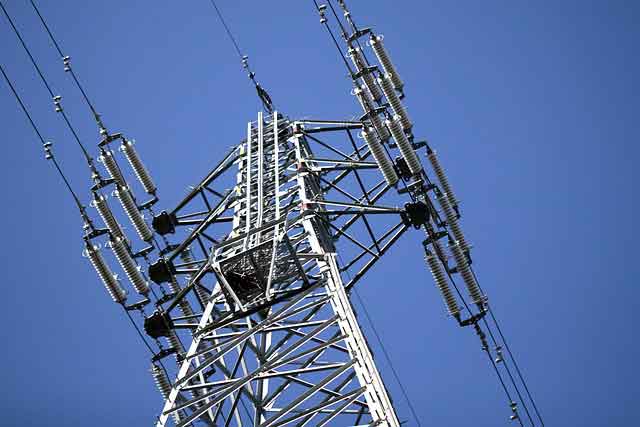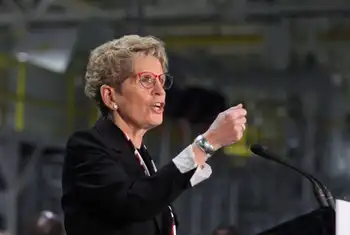Hybrid truck technology lagging
By UPI.com
NFPA 70e Training
Our customized live online or in‑person group training can be delivered to your staff at your location.

- Live Online
- 6 hours Instructor-led
- Group Training Available
The lack of energy-savvy 18-wheelers, buses, military vehicles and delivery trucks doesn't spawn from an absence of need. Both consumers and the trucking industry could benefit greatly from these new technologies, particularly at a time of sky-high diesel prices, Rep. Nick Lampson, D-Texas, said at a hearing in the House Energy and Environment Subcommittee.
"One would be hard pressed to identify an aspect of our daily life that did not intersect with medium- to heavy-duty trucks," said Lampson, the subcommittee's chairman. "Developing technology to increase their fuel economy will lower prices for consumers on everything from groceries to medicine to children's toys."
Grocery bill savings aren't the only benefit, either. Hybrid commercial trucks, which run partially on electric power, have greater potential to reduce fuel consumption and greenhouse gas emissions than their smaller and more widely available counterparts, such as Toyota's Prius.
In fact, the United States' 90,000 garbage trucks use as much fuel as 2.5 million passenger vehicles, according to the Oshkosh Truck Corp., a specialty truck designer and manufacturer.
So the environmental savings of switching even a small percentage of trucks to hybrids could be huge. The Eaton Corp., an industrial manufacturer working with hybrid technology, reports that 10,000 hybrid electric trucks would cut diesel fuel consumption by 7.2 million gallons per year, keeping 83,000 tons of carbon dioxide out of the atmosphere.
With oil prices sparking U.S trucker protests in April and similar demonstrations in the European Union, it would seem logical that demand for fuel-efficient trucks would be skyrocketing. But only a handful of companies, including FedEx and UPS, have picked up the new vehicles, and they haven't bought very many.
Coca-Cola Enterprises has the largest fleet of hybrid delivery trucks in North America at 142, spread all over Canada and the continental United States. So far, the trucks have been a great investment, said Fred Roselli, a company spokesman.
"The trucks themselves have everything from increased fuel economy to reduced emissions, and driver acceptance has been high," Roselli told United Press International.
Hybrid technology works especially well for delivery trucks, because they constantly stop and start and generally drive at low speeds in urban areas.
"An electric generator allows the truck to run on electric power instead of diesel power when it travels under 30 mph," Roselli said.
So why haven't other companies picked up the technology? Upfront costs probably represent the biggest deterrent. Coca-Cola's trucks, for instance, cost an extra $35,000 each.
However, fuel savings over time might compensate for this extra cost, particularly if diesel prices keep rising, said Jennifer Zerwer, environmental news representative for Pacific Gas and Electric, a California utility company that has three hybrid bucket trucks.
"As gas prices continue to rise, so do the benefits of using hybrid technology," Zerwer told UPI.
The company's hybrid trucks use 40 percent to 60 percent less fuel than their conventional trucks - a difference of 1,000 to 1,500 gallons per year. With diesel prices near $5 per gallon, that's a hefty pile of money.
But savings like this won't be enough to get a substantial number of hybrid trucks on the road, said Richard Parish, senior program manager for Calstart Hybrid Truck Users Forum, a program that attempts to speed up commercialization of these technologies.
"The cost in fuel at this point does not cover the total differential cost of hybrid vehicles," Parish said at the hearing. "We'd like to see a long-term commitment by the government to really implement these technologies."
A number of obstacles have made it difficult to deploy medium- to heavy-duty hybrid trucks, said Parish, and the industry is currently about 10 years behind the passenger vehicle sector.
Trucks weigh more than cars, are used for a variety of purposes and often travel long distances, increasing the difficulty of powering them with electricity. Before they become commercially viable, Parish said the industry needs to develop more efficient batteries, downsized engines and lightweight materials, among other things.
In recent years, though, federal funding has been diverted to other programs, said Terry Penney, technology manager for the National Renewable Energy Laboratory.
"The funding from the Department of Energy has been more focused on light-duty vehicles," Penney told representatives.
The main government program addressing the issue, the 21st Century Truck Partnership, has seen considerable funding cuts in recent years, dropping from $42 million in fiscal year 2007 to $25 million in the 2009 budget request.
However, Rep. James Sensenbrenner, R-Wis., has introduced legislation to jump-start the effort. The bill, which Sensenbrenner said he plans to introduce very soon, would establish five grants, awarded to companies, for further research and development for hybrid medium- and heavy-duty trucks.
"New technologies, not taxes, are the answer to climate change," Sensenbrenner said. "My bill will accelerate research and help bring to market (new) technologies."
However, other policymakers at the hearing suggested tax credits might be a more efficient means of pushing hybrids forward, including Rep. Bob Ingles, R-S.C.
"Really, what we're talking about is getting to a place where the incumbent technology is seen for the filth it is," Ingles said. "If you do thatÂ… you have an increased rush of creativity."











